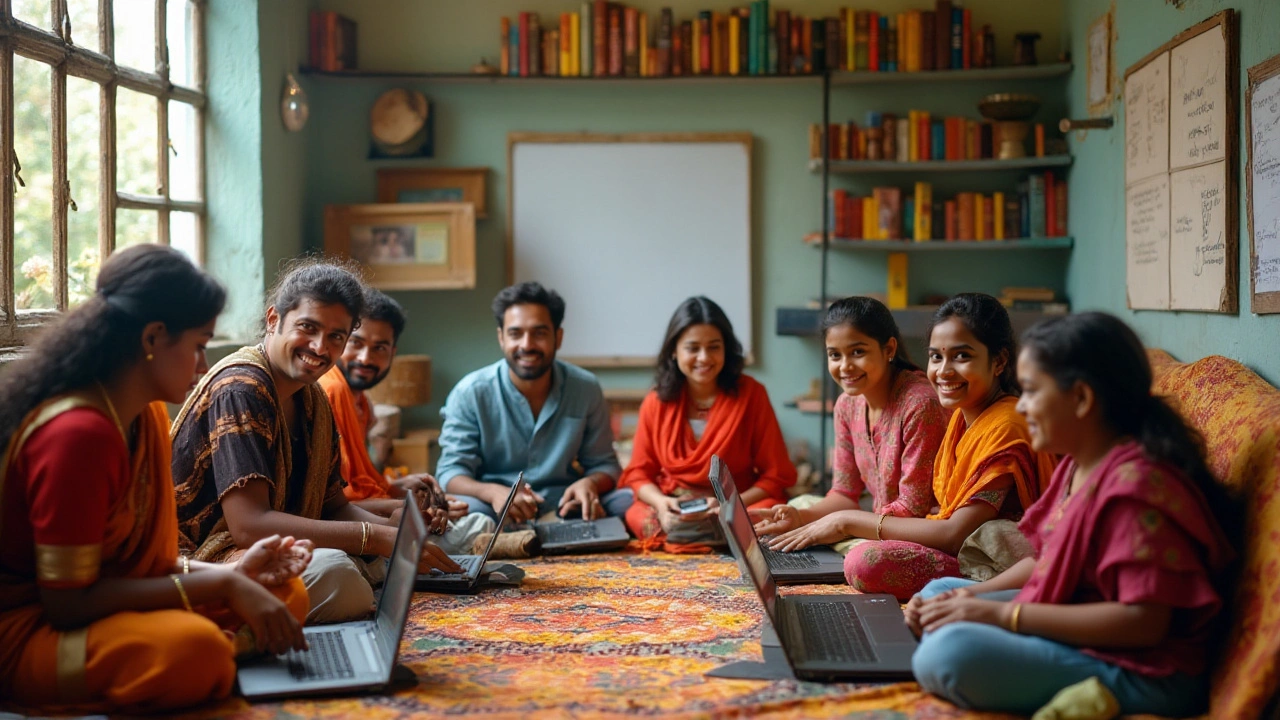Discovering Free Online Courses for Lifelong Learning

In today's digital age, lifelong learning has become more accessible, thanks to the myriad of free courses available online. Whether you’re planning to upgrade your skills or dive into a completely new field, there are plenty of options without spending a dime. This journey can lead you to transform your career or simply enrich your personal life, embracing the limitless potential of knowledge without the financial burden.
In the following sections, we will explore various avenues to find free courses, from massive open online courses (MOOCs) that democratize education to trusted platforms offering free educational resources. We'll give you the tools to differentiate between high-quality courses and those that may not be worth your time, helping you make informed choices about your educational pursuits.
- Introduction to Free Learning Platforms
- Understanding MOOCs and Their Impact
- Popular Free Course Providers
- How to Identify Quality Free Courses
- Utilizing Free Courses for Personal Growth
Introduction to Free Learning Platforms
The modern world has seen an unprecedented surge in the availability and variety of free courses, leading to the development of numerous platforms that cater to diverse learning needs. Finding the right platform can be likened to discovering a treasure trove of knowledge, available at your fingertips. These learning platforms are designed to democratize education, making it accessible to anyone with an internet connection and a desire to learn. As the pace of global change accelerates, the importance of continuous learning cannot be overstated. Online learning spaces have become vibrant communities where knowledge is shared freely, transcending geographical and socio-economic barriers.
One of the most significant innovations in this field is the rise of Massive Open Online Courses (MOOCs). These platforms, like Coursera, edX, and FutureLearn, emerged from prestigious institutions such as MIT and Harvard, aiming to bring the classroom experience online. MOOCs offer an extensive range of courses covering everything from computer science to arts and humanities, and even practical skill-based courses like cooking and photography. By providing access to quality education resources, MOOCs have opened doors for millions of learners worldwide.
According to a study by the Department of Education, online learning can be just as effective, if not more, than traditional classroom environments. This is a testament to how far digital learning has come in replicating—and even enhancing—the personal engagement and interaction found in physical classrooms. The flexibility offered by these platforms allows learners to set their own pace and schedule, effectively accommodating their personal and professional lives.
"Education is the most powerful weapon which you can use to change the world." - Nelson Mandela
Aside from MOOCs, there are specialized platforms like Khan Academy, which focus on K-12 education but also offer content that is suitable for all ages. Khan Academy's mission is to provide a free, world-class education for anyone, anywhere, and this is achieved through its library of over 4,000 video lessons. Such efforts highlight a growing trend towards open educational resources (OERs), which challenge the traditional costs of education.
Apart from structured courses, platforms such as YouTube and podcasts provide a more informal approach to learning. These resources are perfect for someone looking to learn incrementally in their spare time. The wealth of content available means that, regardless of interest area—from learning a new language to mastering coding—you are likely to find valuable lessons for free. However, it's important to approach with a critical mind to identify credible sources free from misinformation.
With the expansive growth of these platforms, accessibility has improved remarkably, but discerning learners should look for accredited programs and peer reviews to ensure quality. In today's world, having the ability to learn independently and staying informed is an asset. As free educational platforms continue to evolve, they play a crucial role in empowering learners to realize their full potential without financial constraints. In the next sections, we'll delve deeper into specific providers and how they are revolutionizing the landscape of free education.
Understanding MOOCs and Their Impact
Massive Open Online Courses, or MOOCs, have revolutionized the way we access education, offering an unprecedented level of access to high-quality learning materials to students around the world. These courses are designed to support a large number of participants and are available through various online platforms, often for free, thus democratizing education on a global scale. The ethos behind MOOCs is centered on accessibility and inclusivity, providing individuals with an opportunity to learn from acclaimed professors and industry experts without the typical barriers of tuition fees and geographic location.
MOOCs initially gained traction in the early 2010s and have since grown into a global phenomenon, driven by universities and educational institutions recognizing the potential of online learning. Courses can range from computer science to humanities, making it possible for learners to diversify their knowledge base across numerous subjects. This has been particularly impactful in regions where educational resources might be limited, offering students a fair shot at quality education. A variety of platforms such as Coursera, edX, and FutureLearn have emerged as frontrunners in offering these transformative free courses, each partnering with prestigious universities like MIT, Harvard, and Stanford.
The benefits extend beyond just academic learning—MOOCs provide an avenue to develop professional skills, often aligning with current industry trends. For instance, courses focused on data science, artificial intelligence, and digital marketing have seen a surge in popularity as they cater to high-demand careers. MOOCs not only broaden knowledge but also enhance employability, proving to be instrumental for career advancement. According to a 2019 study by The University of Illinois, nearly 30% of MOOC learners reported tangible career benefits, such as a new job or a promotion, as a result of completing MOOCs.
"MOOCs represent the single most important advance in higher education in our lifetimes," suggested Thomas Friedman in an article for The New York Times, highlighting the integral role they play in reshaping how we learn.
Despite their advantages, navigating the world of MOOCs requires discernment. The varied course structures mean that not all MOOCs offer the same level of quality or rigor. While many are equivalent to traditional university courses, others might be less comprehensive. It’s crucial to research the course provider, read reviews, and, where possible, preview the course content. Engaging in discussion forums and networking with fellow learners can enrich the learning experience, mirroring the collaborative benefits of a classroom environment. Overall, the impact of MOOCs is multifaceted, offering economic solutions to education and training, critical in a world where lifelong learning is becoming the norm.

Popular Free Course Providers
In the vast sea of online learning, several platforms stand out for their commitment to providing free, accessible education. Among these, a few have gained widespread recognition for offering high-quality courses across diverse fields. One such powerhouse in online education is Coursera, which collaborates with top universities and organizations globally to host free courses in a range of subjects. Although some courses charge for certificates, learners can register for free to access lecture videos and assignments. This model allows you to benefit from world-class education without incurring costs.
Another major player in the realm of free education is edX, founded by Harvard University and MIT. It offers a robust selection of courses available to anyone looking to enhance their knowledge base. Like Coursera, edX partners with leading institutions to provide content that can enrich both professional and personal skills. Whether you’re diving into computer science or exploring the nuances of history, edX stands as a testament to academic excellence accessible without financial constraints. According to edX, "Learning is the source of human progress – and unlocking education for everyone is the key."
Khan Academy is renowned for its focus on K-12 education but equally valued for its vast range of college-level courses and test preparations. Unlike many other platforms, Khan Academy operates on a principle of providing entirely free educational resources, which can be particularly helpful for students lacking access to traditional educational materials. This platform offers an interactive learning experience with personalized dashboards that track learning progress and recommend new content based on the user's performance.
FutureLearn represents yet another compelling option, particularly for those looking to explore diverse courses from history to healthcare. This UK-based platform partners with world-class universities and cultural institutions to deliver free online courses accessible to anyone with an internet connection. Users can pay for an upgraded experience if they wish, but the essential materials are available to everyone at no cost. FutureLearn's community-driven approach fosters a global learning environment enriched by discussions and peer engagement.
Additionally, platforms like Udacity and LinkedIn Learning frequently make select courses available for free as part of promotional offerings or initiatives designed to address skill gaps in the tech industry. These specialized resources can be incredibly valuable if you target your learning towards professional development in areas like programming or digital marketing.
In essence, with a bit of research and exploration, finding free, high-quality, online courses is more manageable than ever. Whether your goal is skill training or satiating your curiosity, these platforms have democratized education, ensuring that learning opportunities are just a few clicks away, waiting to be seized.
How to Identify Quality Free Courses
Finding quality free courses amidst a sea of options can be a daunting task, but it's essential for ensuring your time and effort are well spent. The first step is to examine the source. Reputable platforms like Coursera, edX, and Khan Academy are known for their rigorous standards and partnerships with top universities, providing a level of assurance about the quality of the material. When vetting courses, it's important to look for those developed or endorsed by recognized institutions, as they often reflect a commitment to educational excellence.
Another crucial aspect is the course structure. A quality course will have a clear outline of what you’ll learn, broken down into modules or units that build sequentially. This structured learning path helps maintain focus and facilitates gradual knowledge acquisition. It's beneficial to read the course syllabus or overview, which provides insight into the topics covered and the types of assignments or projects you might encounter. Interactive elements, such as quizzes and assessments, can also indicate a well-designed course, as they engage learners actively and reinforce the material learned.
Don’t underestimate the power of reviews and ratings. Participant feedback can be invaluable for gauging a course’s effectiveness. Platforms often include comments and ratings from past learners, which can provide insights into both the strengths and potential pitfalls of a course. Pay attention to recurring themes in the reviews – whether positive or negative – as they can offer genuine reflections of the course’s value. According to the founder of CourseTalk, a platform dedicated to course reviews, “Learner reviews are important to understand the practical benefits and challenges of the course content.”
“When choosing a free course, considering the experiences shared by previous learners can be as crucial as examining the course outline itself,” said the founder of CourseTalk.
Engaging with the course instructors is another way to assess quality. Many platforms provide instructor bios, and it's wise to take a moment to understand their expertise and experience. Instructors with substantial backgrounds or professional experience in their respective fields are more likely to offer insightful, well-researched content. High-quality free courses often feature instructors who not only have academic qualifications but also possess practical experience, which enriches the course material with real-world perspectives.
If you’re someone who values community learning, courses that offer forums or community sections can be a good fit. Interaction with peers can enhance your learning experience, providing different viewpoints and the ability to discuss and clarify doubts. Some platforms have mentorship options for more intensive learning, where you might receive personal guidance from instructors or advanced students. This additional support can be an excellent indicator of a course’s quality and commitment to student success.

Utilizing Free Courses for Personal Growth
The age of the internet has truly opened the doors to a wealth of knowledge, making self-improvement more accessible than ever. Embracing free courses can transform not only your professional trajectory but also your personal development journey. For those eager to explore new interests or hobbies, platforms like Coursera, edX, and Khan Academy provide hundreds of free courses across dozens of disciplines. You may decide to dive into philosophy, learn visual arts, or understand the essentials of financial literacy—all from the comfort of your home. Learning something outside of your regular professional skill set can spark creativity and foster a more balanced lifestyle.
In leveraging these resources, the key is not just to consume content but to engage with it actively. Many free online courses offer community forums where you can discuss topics with other learners from around the globe, encouraging the sharing of diverse perspectives. This engagement not only deepens your understanding but also builds a network of like-minded peers. Imagine studying astronomy with a scholar halfway across the world or learning French alongside someone in Paris. These connections enrich your educational experiences, providing insights you simply can't gain alone.
Time management plays a critical role in effectively making the most of these educational opportunities. Balancing your schedule might initially seem challenging, particularly if you’re juggling other responsibilities. However, setting realistic goals and dedicating specific times for learning each week helps. You could establish a routine, perhaps studying during commute times or before bed. Consistent commitment, even with just a few hours each week, builds into significant advancements over months. Being intentional about incorporating these courses into your life ensures you're continually progressing without feeling overwhelmed.
The Impact of Acquired Skills on Personal Growth
The skills gained from online learning can significantly impact personal effectiveness. As you accumulate knowledge, you’ll find new ways to apply what you’re learning to daily scenarios. For instance, understanding the principles of economics can aid in managing your household budget more efficiently. Courses in psychology might offer new approaches to communication, enhancing personal and professional relationships. The firsthand experience of overcoming academic challenges bolsters resilience and adaptability—qualities invaluable in an ever-evolving world.
"The higher your skill level, the more autonomy you will have in the marketplace," noted by Cal Newport in his acclaimed book, Deep Work. Amidst our fast-paced world, these courses carve out space for profound, focused learning, providing a real antidote to the distracted life.”
Ultimately, investing in yourself through free education paves the path towards a more fulfilled life. It empowers you with the confidence to tackle new challenges and aids in the relentless pursuit of personal growth. By continuously upgrading your skills, you’re not just positioned for career success, but for a life rich with opportunities for exploration and self-discovery.

Post-Comment